英语听力材料:英语听力与阅读答案资料
- 格式:docx
- 大小:37.57 KB
- 文档页数:3
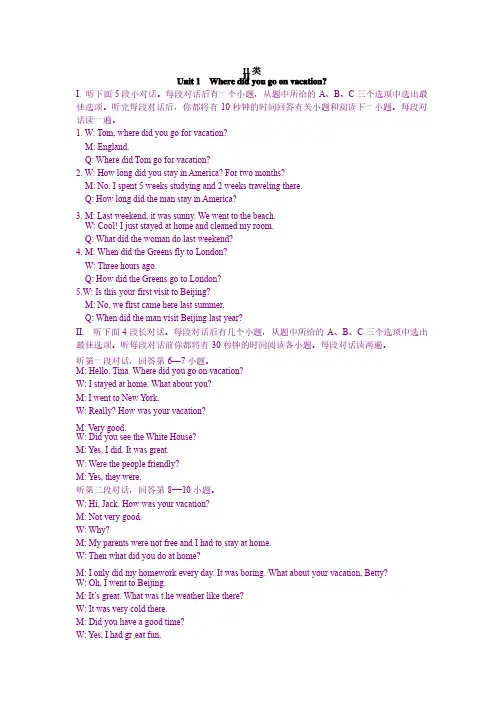
II类Unit 1 Where did you go on vacation?I. 听下面5段小对话。
每段对话后有一个小题,从题中所给的A、B、C三个选项中选出最佳选项。
听完每段对话后,你都将有10秒钟的时间回答有关小题和阅读下一小题。
每段对话读一遍。
1. W: Tom, where did you go for vacation?M: England.Q: Where did Tom go for vacation?2. W: How long did you stay in America? For two months?M: No. I spent 5 weeks studying and 2 weeks traveling there.Q: How long did the man stay in America?3. M: Last weekend, it was sunny. We went to the beach.W: Cool! I just stayed at home and cleaned my room.Q: What did the woman do last weekend?4. M: When did the Greens fly to London?W: Three hours ago.Q: How did the Greens go to London?5.W: Is this your first visit to Beijing?M: No, we first came here last summer.Q: When did the man visit Beijing last year?II. 听下面4段长对话。
每段对话后有几个小题,从题中所给的A、B、C三个选项中选出最佳选项。
听每段对话前你都将有30秒钟的时间阅读各小题。
每段对话读两遍。
听第一段对话,回答第6—7小题。
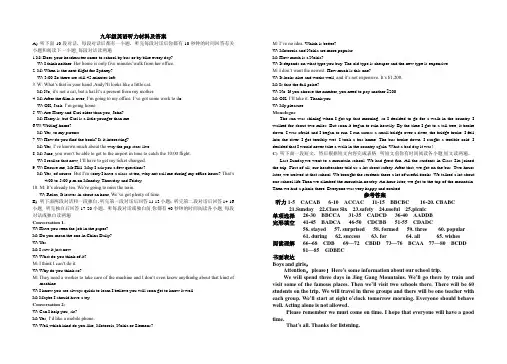
九年级英语听力材料及答案A) 听下面10段对话,每段对话后都有一小题,听完每段对话后你都有10秒钟的时间回答有关小题和阅读下一小题,.每段对话读两遍.1.M: Does your headmaster come to school by bus or by bike every day?W: I think neither. Her home is only five minutes’walk from her office.2. M: When is the next flight for Sydney?W: 3:00.So there are still 45 minutes left.3. W: What’s that in your hand ,Andy?It looks like a little cat.M: No, it’s not a cat, but a hat.It’s a present from my mother.4. M: After the film is over, I’m going to my office.I’ve got some work to d o.W: OK, Jack. I’m going home.5. W: Are Harry and Carl older than you, John?M: Harry is, but Carl is a little younger than me.6 W: Writing home?M: Yes, to my parents.7. W: How do you find the book? Is it interesting?M: Yes, I’ve known much about the way the pop stars live.8. M: Jane, you won’t be able to get to the airport in time to catch the 10:00 flight.W: I realize that now, I’ll have to get my ticket changed.9. W: Excuse me, Mr Hill. May I ask you a few questions?M: Yes, of course. But I’m s orry I have a class at ten, why not call me during my office hours? That’s 4:00 to 5:00 p.m.on Monday, Thursday and Friday.10. M: It’s already ten.We’re going to miss the train.W: Relax, It leaves in about an hour, We’ve got plenty of time.B) 听下面两段对话和一段独白,听完第一段对话后回答11-13小题; 听完第二段对话后回答14-16小题, 听完独白后回答17-20小题。
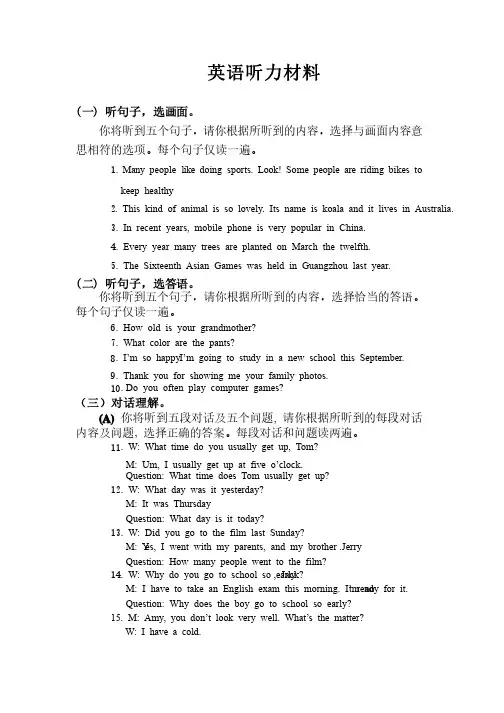
英语听力材料(一) 听句子,选画面。
你将听到五个句子,你将听到五个句子,请你根据所听到的内容,请你根据所听到的内容,请你根据所听到的内容,选择与画面内容意选择与画面内容意思相符的选项。
每个句子仅读一遍。
思相符的选项。
每个句子仅读一遍。
1. . Many Many Many people people people like like like doing doing doing sports. sports. sports. Look! Look! Look! Some Some Some people people people are are are riding riding riding bikes bikes bikes to to keep healthy . 2. This kind of animal is so lovely. Its name is koala and it lives in Australia. 3. In recent years, mobile phone is very popular in China. 4. Every year many trees are planted on March the twelfth. 5. The Sixteenth Asian Games was held in Guangzhou last year. (二) 听句子,选答语。
你将听到五个句子,请你根据所听到的内容,选择恰当的答语。
每个句子仅读一遍。
每个句子仅读一遍。
6. How old is your grandmother? 7. What color are the pants? 8. I’m so happy . I’m going to study in a new school this September.9. Thank you for showing me your family photos.10.Do you often play computer games? (三)对话理解。
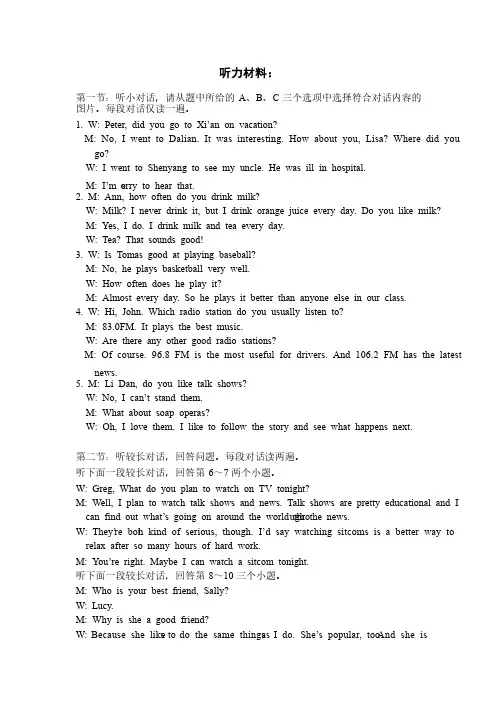
听力材料:第一节:听小对话,请从题中所给的A 、B 、C 三个选项中选择符合对话内容的图片。
每段对话仅读一遍。
图片。
每段对话仅读一遍。
1. W: Peter, did you go to Xi’an on vacation?M: No, I went to Dalian. It was interesting. How about you, Lisa? Where did you go? W: I went to Shenyang to see my uncle. He was ill in hospital. M: I’m s o rry to hear that. orry to hear that. 2. M: Ann, how often do you drink milk? W: Milk? I never drink it, but I drink orange juice every day. Do you like milk? M: Yes, I do. I drink milk and tea every day. W: Tea? That sounds good! 3. W: Is Tomas good at playing baseball? M: No, he plays basketball very well. W: How often does he play it? M: Almost every day. So he plays it better than anyone else in our class. 4. W: Hi, John. Which radio station do you usually listen to? M: 83.0FM. It plays the best music. W: Are there any other good radio stations? M: Of course. 96.8 FM is the most useful for drivers. And 106.2 FM has the latest news. 5. M: Li Dan, do you like talk shows? W: No, I can’t stand them.M: What about soap operas? W: Oh, I love them. I like to follow the story and see what happens next. 第二节:听较长对话,回答问题。

初一英语答案及听力材料TYYGROUP system office room 【TYYUA16H-TYY-TYYYUA8Q8-2010~2011学年度第一学期期中考试初一英语听力材料及答案听力材料(读一遍). I read newspapers here(C)are the grey trousers(C)is Millie’s racket(B)Peter at home now(A)you like listening to music(C)根据你所听到的对话和问题选择正确答案(读两遍) (5分)6. M: Meimei, how many lessons do you have every day?W: I have four in the morning, and two in the afternoon.Q: How many lessons does Meimei have every day?7. M: Where were you born, LilyWere you born in LondonW: No. I was born in Shanghai.Q: Where was Lily born?8. M: What do you do on Sunday morning?W: I get up at 7:00. Half an hour later, I have breakfast. Then I do my homework.Q: When does the girl have breakfast on Sunday morning?9. M: What does Daniel look like?W: He’s fat and short.Q: Wha t’s Daniel like?10. M: Does Amy like playing basketball?W: No, she likes playing volleyball.Q: What does Amy like doing?第 3 大题的提示语:(三),听短文,选择正确答案(读两遍)Dear friends, I go to school from Monday to Friday. Every morning, I get up at 6:50 a.m. .I run to school because the principle talks to us at 7:30 a.m. every day. I like her. But I am afraid of her. At 8:00 a.m., we begin with our lessons. I can go home at 4:30 . The teacher dislikes me because I like chatting with my classmates in class. My favourite lesson is . It's fun. I'm good at sports. I dislike Maths because It's too you write to me soonYours Simon.答案一.听力部分15%1—-5 CCBAC 6—10 CBACB 11—15 BCCCB二.单项选择15%1—-5 BCABD 6—10 ABBCC 11—15 ABCBD三.完型填空10%1—-5 AADBA 6—10 CBDDB四. 阅读理解10%1—-5 ACBBC 6—10 CBDCC五.词汇10%3. washes4. shopping六、动词填空 10%2. play3. studies4. open5. to drink6. swimming7. (to) clean8. to buy9. singing七. 句型转换10%1. don’t do2. Does, have is 4. to have 5. What time八、翻译句子10%are 4 people__________________in Jim’s family.2. He __goes home by bus___ everyday.3. __Whose book___ is this?4. It’s too cold. __Don’t open__ the door.often__chats with her friends__ on the Internet.九.书面表达:10%你新交了一个朋友David,请你介绍一下他!以My friend为题(用第三人称哦)姓名David, 年龄13岁,出生于南京,现在住在东台,外貌又高又瘦,头发短而黑,戴眼镜.爱好玩电脑游戏,听音乐.不擅长体育。
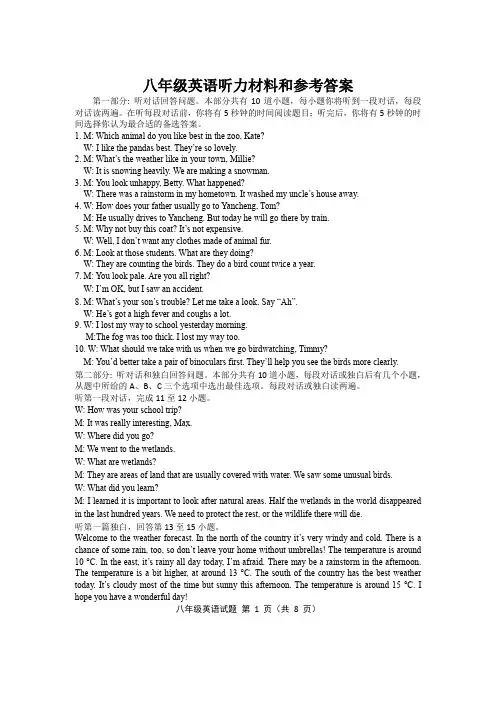
八年级英语听力材料和参考答案第一部分: 听对话回答问题。
本部分共有10道小题,每小题你将听到一段对话,每段对话读两遍。
在听每段对话前,你将有5秒钟的时间阅读题目;听完后,你将有5秒钟的时间选择你认为最合适的备选答案。
1. M: Which animal do you like best in the zoo, Kate?W: I like the pandas best. They’re so lovely.2. M: What’s the weather like in your town, Millie?W: It is snowing heavily. We are making a snowman.3. M: You look unhappy, Betty. What happened?W: There was a rainstorm in my hometown. It washed my uncle’s house away.4. W: How does your father usually go to Yancheng, Tom?M: He usually drives to Yancheng. But today he will go there by train.5. M: Why not buy this coat? It’s not expensive.W: Well, I don’t want any clothes made of animal fur.6. M: Look at those students. What are they doing?W: They are counting the birds. They do a bird count twice a year.7. M: You look pale. Are you all right?W: I’m OK, but I saw an accident.8. M: What’s your son’s trouble? Let me take a look. Say “Ah”.W: He’s got a high fever and coughs a lot.9. W: I lost my way to school yesterday morning.M:The fog was too thick. I lost my way too.10. W: What should we take with us when we go birdwatching, Timmy?M: You’d better take a pair of binoculars first. They’ll help you see the birds more clearly.第二部分: 听对话和独白回答问题。
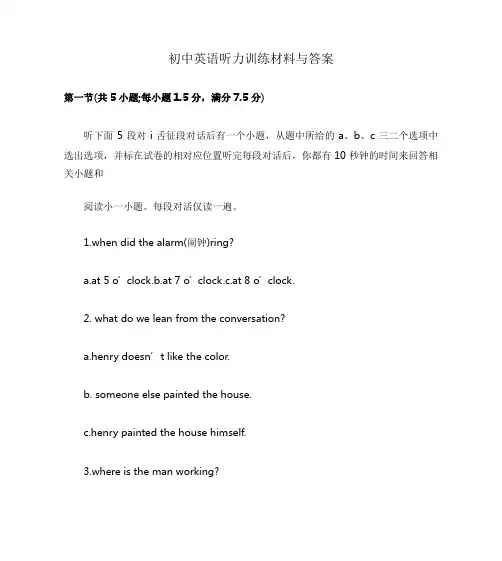
初中英语听力训练材料与答案第一节(共5小题;每小题1.5分,满分7.5分)听下面5段对i舌征段对话后有一个小题,从题中所给的a、b、c三二个选项中选出选项,并标在试卷的相对应位置听完每段对话后,你都有10秒钟的时间来回答相关小题和阅读小一小题。
每段对活仅读一遍。
1.when did the alarm(闹钟)ring?a.at 5 o’clock.b.at 7 o’clock.c.at 8 o’clock.2. what do we lean from the conversation?a.henry doesn’t like the color.b. someone else painted the house.c.henry painted the house himself.3.where is the man working?a.in a beer shop.b. in a bus station.c. in a restaurant.4.what does the woman mean?a.they don’t have many tickets.b.it is bard for them to get any tickets.c.all the tickets are sold out.5.how will the couple get home?a.they will walk home.b.they will take a taxi.c.they will take the subway(地铁).第二节(共15小题;每小题1.5分,满分22.5分)听下面五段对话或独白每段对话或独白后有儿个小题,从每题所给的a,b,c只个选项中选出选项,并标在试卷的相对应位置。
听每段对话或独白前,你将有时间阅读各个小题,每小题5秒钟;听完后,各小题将给出5秒钟的作答时间:。
每段对话或独白读两遍。
听第6段材料,回答第6至7题。
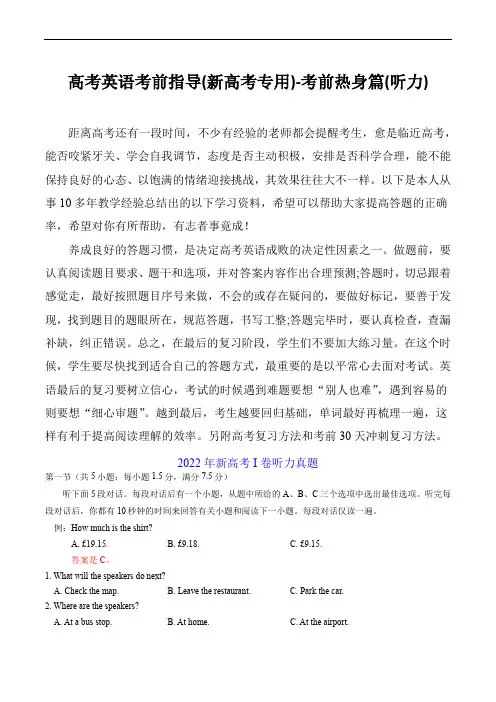
高考英语考前指导(新高考专用)-考前热身篇(听力)距离高考还有一段时间,不少有经验的老师都会提醒考生,愈是临近高考,能否咬紧牙关、学会自我调节,态度是否主动积极,安排是否科学合理,能不能保持良好的心态、以饱满的情绪迎接挑战,其效果往往大不一样。
以下是本人从事10多年教学经验总结出的以下学习资料,希望可以帮助大家提高答题的正确率,希望对你有所帮助,有志者事竟成!养成良好的答题习惯,是决定高考英语成败的决定性因素之一。
做题前,要认真阅读题目要求、题干和选项,并对答案内容作出合理预测;答题时,切忌跟着感觉走,最好按照题目序号来做,不会的或存在疑问的,要做好标记,要善于发现,找到题目的题眼所在,规范答题,书写工整;答题完毕时,要认真检查,查漏补缺,纠正错误。
总之,在最后的复习阶段,学生们不要加大练习量。
在这个时候,学生要尽快找到适合自己的答题方式,最重要的是以平常心去面对考试。
英语最后的复习要树立信心,考试的时候遇到难题要想“别人也难”,遇到容易的则要想“细心审题”。
越到最后,考生越要回归基础,单词最好再梳理一遍,这样有利于提高阅读理解的效率。
另附高考复习方法和考前30天冲刺复习方法。
2022年新高考I卷听力真题第一节(共5小题;每小题1.5分,满分7.5分)听下面5段对话。
每段对话后有一个小题,从题中所给的A、B、C三个选项中选出最佳选项。
听完每段对话后,你都有10秒钟的时间来回答有关小题和阅读下一小题。
每段对话仅读一遍。
例:How much is the shirt?A. £19.15.B. £9.18.C. £9.15.答案是C。
1. What will the speakers do next?A. Check the map.B. Leave the restaurant.C. Park the car.2. Where are the speakers?A. At a bus stop.B. At home.C. At the airport.3. What did the speakers do last week?A. They had a celebration dinner.B. They went to see a newborn baby.C. They sent a mail to their neighbors.4. Why does the man make the phone call?A. To cancel a weekend trip.B. To make an appointment.C. To get some information.5. What does the man probably want to do?A. Do some exercise.B. Get an extra key.C. Order room service.第二节(共15小题;每小题1.5分,满分22.5分)听下面5段对话或独白。
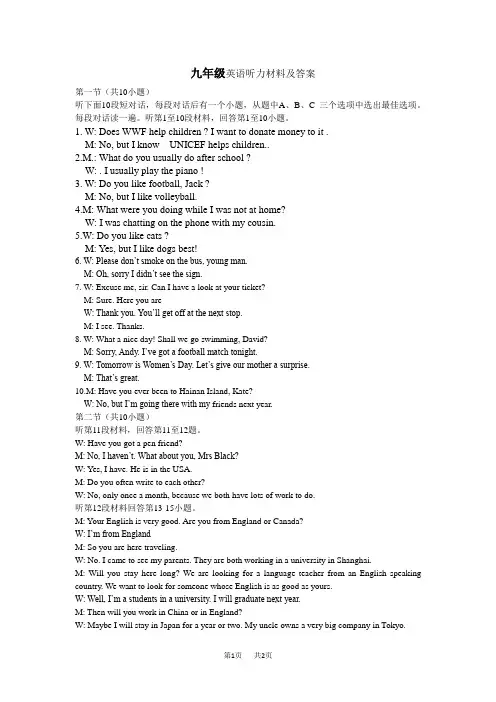
九年级英语听力材料及答案第一节(共10小题)听下面10段短对话,每段对话后有一个小题,从题中A、B、C 三个选项中选出最佳选项。
每段对话读一遍。
听第1至10段材料,回答第1至10小题。
1. W: Does WWF help children ? I want to donate money to it .M: No, but I know UNICEF helps children..2.M.: What do you usually do after school ?W: . I usually play the piano !3. W: Do you like football, Jack ?M: No, but I like volleyball.4.M: What were you doing while I was not at home?W: I was chatting on the phone with my cousin.5.W: Do you like cats ?M: Yes, but I like dogs best!6. W: Please don’t smoke on the bus, young man.M: Oh, sorry I didn’t see the sign.7. W: Excuse me, sir. Can I have a look at your ticket?M: Sure. Here you areW: Thank you. You’ll get off at the next stop.M: I see. Thanks.8. W: What a nice day! Shall we go swimming, David?M: Sorry, Andy. I’ve got a football match tonight.9. W: Tomorrow is Women’s Day. Let’s give our mother a surprise.M: That’s great.10.M: Have you ever been to Hainan Island, Kate?W: No, but I’m going there with my friends next year.第二节(共10小题)听第11段材料,回答第11至12题。
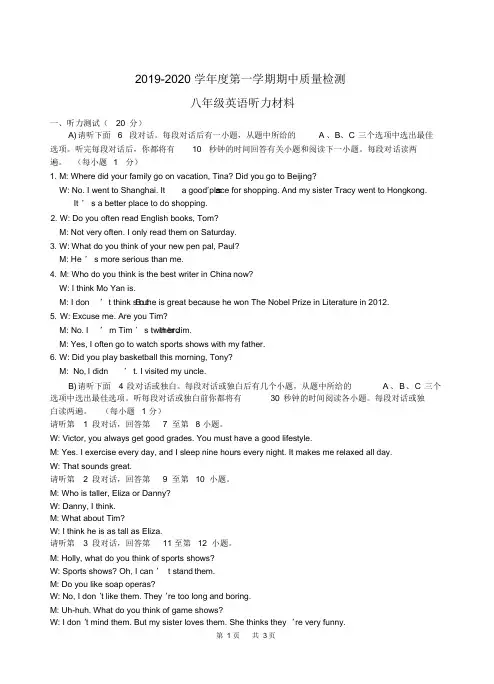
2019-2020 学年度第一学期期中质量检测八年级英语听力材料一、听力测试(20 分)A) 请听下面 6 段对话。
每段对话后有一小题,从题中所给的 A 、B、C 三个选项中选出最佳选项。
听完每段对话后,你都将有10 秒钟的时间回答有关小题和阅读下一小题。
每段对话读两遍。
(每小题 1 分)1. M: Where did your family go on vacation, Tina? Did you go to Beijing?W: No. I went to Shanghai. It a good’pl s ace for shopping. And my sister Tracy went to Hongkong.It ’s a better place to do shopping.2. W: Do you often read English books, Tom?M: Not very often. I only read them on Saturday.3. W: What do you think of your new pen pal, Paul?M: He ’s more serious than me.4. M: Who do you think is the best writer in China now?W: I think Mo Yan is.M: I don ’t think s B o u.t h e is great because he won The Nobel Prize in Literature in 2012.5. W: Excuse me. Are you Tim?M: No. I ’m Tim ’s twi t n he b r ro Jim.M: Yes, I often go to watch sports shows with my father.6. W: Did you play basketball this morning, Tony?M: No, I didn ’t. I visited my uncle.B) 请听下面 4 段对话或独白。
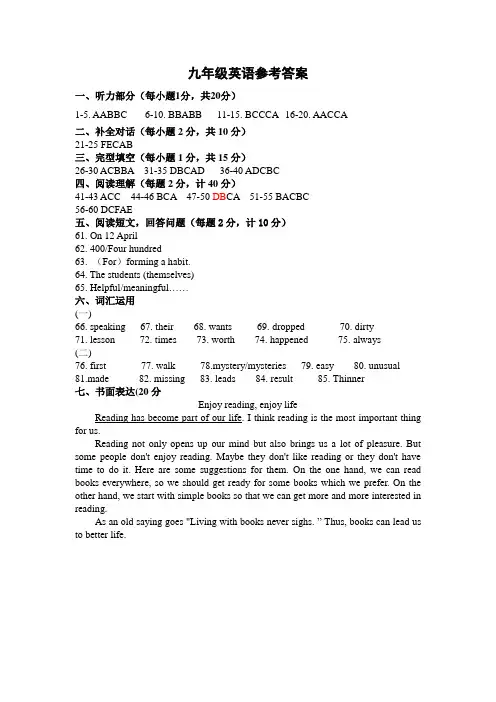
九年级英语参考答案一、听力部分(每小题1分,共20分)1-5. AABBC 6-10. BBABB 11-15. BCCCA 16-20. AACCA二、补全对话(每小题2分,共10分)21-25 FECAB三、完型填空(每小题1分,共15分)26-30 ACBBA 31-35 DBCAD 36-40 ADCBC四、阅读理解(每题2分,计40分)41-43 ACC 44-46 BCA 47-50 DB CA 51-55 BACBC56-60 DCFAE五、阅读短文,回答问题(每题2分,计10分)61. On 12 April62. 400/Four hundred63. (For)forming a habit.64. The students (themselves)65. Helpful/meaningful……六、词汇运用(一)66. speaking 67. their 68. wants 69. dropped 70. dirty71. lesson 72. times 73. worth 74. happened 75. always(二)76. first 77. walk 78.mystery/mysteries 79. easy 80. unusual81.made 82. missing 83. leads 84. result 85. Thinner七、书面表达(20分Enjoy reading, enjoy lifeReading has become part of our life. I think reading is the most important thing for us.Reading not only opens up our mind but also brings us a lot of pleasure. But some people don't enjoy reading. Maybe they don't like reading or they don't have time to do it. Here are some suggestions for them. On the one hand, we can read books everywhere, so we should get ready for some books which we prefer. On the other hand, we start with simple books so that we can get more and more interested in reading.As an old saying goes "Living with books never sighs. ” Thus, books can lead us to better life.听力材料一.听对话回答问题(计10分)1. W: Could I have some beef noodles, please?M: Beef noodles. OK.2. M: Excuse me, where's Sunshine Library?W: Turn left, walk straight ahead and you'll see it.3. M: Jane, don't forget to take your umbrella to school today.W:I've already got it here. Thanks, Dad.4. W: What are some good things and bad things about camping, Peter? M: I like hiking, but I don't like plants!5. W: David, I think we should go swimming today.M: I'm too tired. Let's just watch TV.6. W: Sam, Suzy and I are planning a barbecue. Would you like to come,Frank?M: OK. What can I bring? How about some paper plates?7. W: I just saw a beautiful diamond necklace at the jewellery shop. M: It might cost lots of money. Look around more.8. M: We'll have a concert next week. I'm practicing singing these days.What about you, Amy?W: I'm practising the violin all day.9. W: Millie and Susan are arguing again.M: Yes. Millie has lost Susan's new book.10. M: Mary, I'm an outgoing person. How can I get a better job?W: Try to be more patient and modest. Otherwise, they may choose someone else.二.听对话和短文回答问题(计10分)听第一段对话,回答第11、12小题。
八年级英语听力材料及答案一、听力(共20小题,每小题1分,满分20分)A)听对话及问题,选出与所听内容相符的选项。
每小题读一遍。
1. W: What’s your favourite sport, Mike?M: I’m not quite sure. I like cycling better than camping. But I like camping better than skiing. Q: What sport is Mike’s favourite? A2. W: Which city do you think is the best place to have a holiday in the coming May Day holiday? M: I think Washington may be. CQ: What place is Jack going to spend his holiday?3. W: What subject do you like best, Peter?M: I like Home Economics because I want to learn how to cook healthy and tasty meals.Q: Which is Peter’s favourite subject ? B4. M: What does your father do ?W: He is a doctor and he wants me to be a doctor like him. But I like singing very much. I don’t want to be a doctor.Q: What does the girl want to be in the future? A5. W: Can I help you?M: I’d like to buy a coat for my son. BQ: Where are they?6. W: How much is the best room a day?M: For one week it will be $700. BQ: How much is the room a day?7. W: It’s June now. How long will you stay here?M: one and a half months.Q: When will he leave? C8. W: Excuse me, Daniel. May I use your computer?M: Sorry, there is something wrong with it.Q: Can the girl use the computer now? C9. M: School is over. Why don’t you go home, Amy?W: You know I’m a member of the Reading Club. I’m going to the library and read books with my friends.Q: Where will Amy go before she goes home? B10. W: How did you go to Beijing last summer?M: By train. It was a really a wonderful trip there. And we flew back after a ten-day visit.Q: How did the man return? A听第一段对话回答第11-12题。
七年级上册英语听力与阅读答案[2篇]以下是网友分享的关于七年级上册英语听力与阅读答案的资料2篇,希望对您有所帮助,就爱阅读感谢您的支持。
第1篇七年级上册英语听力m1~m4学生用书:(P2 Module 1 Unit 1 Part 3 )试题:()1、what is Miss Li?A. a doctorB. a teacherC. a worker ()2. where is Lingling from? A. Beijing B. Shanghai C. New York()3. What is the relationship between Lingling and Daming?A. friendsB. sister and brotherC. mother and son ()4. How old is Wanghui?A. 11B. 12C. 13(P8 Module 2 Unit 1 Part 3)试题:()1. Where is Betty from? A. China B. America C. England ()2. How old is Betty?A11 B. 12 C. 13()3. Where is T ony from? A. China B. America C. England ()4. How old is T ony?A11 B. 12 C. 13(P14 Module3 Unit1 Part3)试题:()1. How many students are there in a class in Betty’s school?A. 20B. 21C. 22()2. How many boys are there in Daming’s class?A. 22B. 24C. 25()3. Who has a computer in Daming’s class?A. DamingB. Miss LiC. No one( P21 Module 4 unit1 part3)第2篇七年级上册英语听力m1~m4学生用书:(P2 Module 1 Unit 1 Part 3 )试题:()1、what is Miss Li?A. a doctorB. a teacherC. a worker()2. where is Lingling from?A. BeijingB. ShanghaiC. New York()3. What is the relationship between Lingling and Daming?A. friendsB. sister and brotherC. mother and son()4. How old is Wanghui?A. 11B. 12C. 13(P8 Module 2 Unit 1 Part 3)试题:()1. Where is Betty from?A. ChinaB. AmericaC. England()2. How old is Betty?A11 B. 12 C. 13()3. Where is T ony from?A. ChinaB. AmericaC. England()4. How old is T ony?A11 B. 12 C. 13(P14 Module3 Unit1 Part3)试题:()1. How many students are there in a class in Betty’s school?A. 20B. 21C. 22()2. How many boys are there in Daming’s class? A. 22 B. 24 C. 25()3. Who has a computer in Daming’s class?A. DamingB. Miss LiC. No one( P21 Module 4 unit1 part3)试题:()1. How many people are there in T ony’s family? A. 3 B. 4 C. 5()2. How many uncles does T ony have?A. 1B. 2C. 3()3. T ony doesn’t have any grandparents?A. Yes, he does.B. No, he doesn’t.C. Sorry, I don’t know.学生用书(听力材料) :(P2 Module 1 Unit 1 Part 3 )Miss Li: Hello. My name’s Miss Li. I’m a teacher and I’m Chinese. I’m from Wuhan.What’s your name? Where are you from?LingLing: My name’LingLing. I’m from Beijing. I’m twelve years old and I’mChinese. This is Daming. He’s my friend .We’re students. Daming: Hello. My name’s Daming. I’m a student and I’m twelve years old. I’mfrom Beijing. Lingling is my friend. What’s your name? Wang Hui: My name’s Wang Hui. I’m a student and I’m from Shanghai and I’m astudent. I’m Chinese. I’m in Class One.Miss Li: Nice to meet you, Wang Hui.Wang Hui: Nice to meet you, too.(P8 Module 2 Unit 1 Part 3)Miss Li: Please welcome Betty and T ony to our school. They are from BeijingInternational School. This is Betty.Betty: Hello. My name’s Betty. I’m from America. I’m13 years oldand I’m a student. I can play football and I can play basketball. I can speak English, but I can’t speak Chinese. This is T ony. He’s my friend.T ony: Hello. My name’s T ony . I’m 11years old. I’m from England and I canspeak English. I can play football and table tennis, and I can ride a bike.Lingling: Can you swim?T ony: No, I can’t. And I can’t speak Chinese!(P14 Module3 Unit1 Part3)Betty: In our school, there are 20 students in a class. In my classroom, there’s ablackboard and there are 22 desks.Daming: There are 46 students in my class. That’s 24 boys and 22 girls. No, that’s notright. There are 25 boys and 21 girls. There are 48 desks. Betty: Are there any computers on your desks? Is there a computer on Miss Li’sdesk?Daming: No, there isn’t. There isn’t a computer on MissLi’s desk. And there aren’tany computer on our desks. Are there any computer in your classroom?Betty: No, there aren’t.( P21 Module 4 unit1 part3)Lingling: How many people are there in your family?T ony: There are four —my mum and dad, m y sister Linda, and me. I haven’t got any brothers.Lingling: Have you got any aunts or uncles?T ony: My dad’s got a brother and a sister. My mum’s got a brother, but she hasn’t got a sister. So I’ve got one aunt and two uncles. And I’ve got four grandparents.教师用书(书上的题):(教参P38 Module 1 Unit 1 Part 1)试题:()1. How many people are speaking?A. 2B. 3C. 4(教参P52 Module 2 Unit 1 Part 2)试题:()1. What can Lingling play?A. football and tennisB. football and basketballC. tennis and basketball()2. Can Lingling ride a horse?A. Yes, she can.B. No, she can’t.C. Sorry, I don’t know.(教参P64 Module 3 Unit 1 Part 2)试题:()1. In T ony’s class, there are ____girls.A. 25B. 15C. 10()2. What’s on the desk?A. a computer and some booksB. some books and dictionariesC. some dictionaries and a computer(教参p76 Module4 unit1 part2)试题:()1. How many aunts does T ony have?A. 1B. 2C. 4()2. What is T ony’s sister’s name?A. LilyB. BettyC. Linda教师用书(书上的题)〈听力材料〉:(教参P38 Module 1 Unit 1 Part 1)Wang Hui: Hello. My name’s Wang Hui.Lingling: Hello. My name’s Lingling.Wang Hui: Nice to meet you, Lingling.Lingling: Nice to meet you, Wang Hui.Wang Hui: I’m a new student. Are you a new student? Lingling: Yes, I am.(教参P52 Module 2 Unit 1 Part 2)Betty: Lingling, can you play football?Lingling: Y es, I can. I can play football and I can play tennis. But I can’t playbasketball.Betty: Can you ride a horse?Lingling: No, I can’t. But I can swim.(教参P64 Module 3 Unit 1 Part 2)Betty: This is our school, Beijing International School.T ony: This is my classroom. There are twenty-five students in my class. Fifteen aregirls and ten are boys. There are twenty-six desks in myclassroom. There are some books on the desks. There are also some dictionaries on the desks. But there aren’t any computers in my classroom.(教参p76 Module4 unit1 part2)Daming: Have you got a big family, T ony?T ony: Y es, I have. Look! This is a photo of my family. These are my grandparents at the back. I’ve got two grandfathers and two grandmothers .I’ve got two uncles and I’ve got one aunt.Daming: Have you got any brothers or sisters?T ony: Yes, this is my sister at the front. Her name’s Linda.教师用书(workbook 题)(教参P44 workbook 题Module 1 Exercise 8)试题:()1. How old is Daming?A. 11B. 12C. 14()2. Who is Daming’s teacher?A. Miss ZhangB. Miss LiC. Miss Wang()3. How old is Wanghui?A11 B. 12 C. 13(workbook题Module 1 Exercise 9)试题:()1. Where is Peter from?A. AmericaB. ChinaC. England()2. Where does Peter live?A. in a hotelB. in a flatC. at school(workbook题Module 1 Exercise 10)试题:()1. How old is Lingling?A. 12B. 13C. 14()2. what is the relationship between Lingling and Daming?A. they are friends.B. They are brother and sister.C. They do not know each other.()3. Which class is Daming in?A. Class 1B. Class 2C. Class 3()4. Miss Li is from England, isn’t she?A. Yes, she is.B. No, she isn’t.C. No, she doesn’t.(教参P57 workbook 题Module 2 Exercise 10 )()1. Can Lingling talk about jobs in English?A. Yes, she can.B. No, she can’t.C. Sorry, I don’t know. ()2. What can Daming talk about in English?A. work placesB. jobsC. sports(workbook题Module 2 Exercise 11 )试题:()1. where is Betty from?A. AmericaB. EnglandC. Canada()2.where is T ony from?A. AmericaB. EnglandC. Canada()3.What can they both do?A. Play football and basketball.B. Play tennis and ride a bikeC. Speak English.()4.What can T ony do?A. Play football and basketball.B. Play tennis and ride a bikeB. Speak English.(workbook题Module 2 Exercise 12 )()1. Where is Helen from?A. AmericaB. EnglandC. Canada()2.Where is Sam from?A. AmericaB. EnglandC. Canada()3.What can Sam talk about in Chinese?A. JobsB. SportsC. Work places(教参P69 workbook 题Module3 Exercise 11)试题:()1. How many desks are there in Sam’s class?A. 42B. 43C. 51()2. How many girls are there in Helen’s class?A. 42B. 24C. 27()3. Who is next to Helen?A. SamB. DavidC. No one.(workbook题Module3 Exercise 12)试题:()1. What’s Betty’s brother’s name?A. T onyB. RobertC. Helen()2.How many classmates does he have?A. 20B. 30C. 40(workbook题Module3 Exercise 13)试题:()1. whose desk is behind Wang Hui’s desk?A. Daming’sB. Jiangli’sC. mine()2. Whose desk is behind my desk?A. Daming’sB. Sun Yong ’sC. Zhang Ya’s(教参p80 workbook题Module4 Exercise10)试题:()1. Does T ara have a father?A. Ye s, she does.B. No, she doesn’t.C. Sorry, I don’t know.()2. How many brothers does she have?A. 1B. 2C. 3()3. How many people are there in her family all together?A. 6B. 7C. 8(workbook题Module4 Exercise12)试题:()1. How many brothers does T ara have?A. 1B. 2C. 3()2. How old is one of her grandparents?A. 84B. 86C. 88()3. How many children does one of her aunts have? A. 3 B. 5 C. 6教师用书(workbook 题)〈听力材料〉(教参P44 workbook 题Module 1 Exercise 8)Daming: Hello. My name’s Daming. I’m 12 years old. I’m in Class One. Myteacher is Miss Li. What’s your name?Wang Hui: Hello. My name’s Wang Hui. I’m a new student. My teacher is Miss Li,too. I’m 13 years old. I’m from China and I’m Chinese.(workbook题Module 1 Exercise 9)Peter is from England. He is now in China. He speaks Chinese well. He lives in a flat with a Chinese family.(workbook题Module 1 Exercise 10)Linging is a student. She isn’t from England and she isn’t English. She’s from China and she is Chinese. She is 12years old.Daming is a student. He is not in class 2. he is in Class One. He is in Miss Li’s class. He is from China and he is Chinese. He is 12 years old. Lingling and Daming are good friends. Miss Li is a teacher. She is not from England and she is not English. She is from China and she is Chinese. She is not a student. Daming and Lingling are in Miss Li’s class.(教参P57 workbook 题Module 2 Exercise 10 ) Daming: I can’t talk about jobs in English. Lingling. Can you?Lingling: Y e s, I can, I can talk about jobs in English. But I can’t talk about workplaces in English. Can you?Daming: No, I can’t. But I can talk about sports in English. (workbook题Module 2 Exercise 11 )Betty and T ony are good friends. Betty is from America. T ony is from England. They both speak English. Betty plays football and basketball. T ony can play tennis and ride a bike.(workbook题Module 2 Exercise 12 )Helen is American. She can talk about jobs in Chinese. Shecan play basketball but she can’t talk about sports in Chinese. And she can’t talk about work places in Chinese. Sam is English. He can’t talk about jobs in Chinese. And he can’t talk about work places in Chinese. But he can talk about sports in Chinese.(教参P69 workbook 题Module3 Exercise 11)Sam: (My name is Sam.) There are 42 students in my class. In my classroom, there’sa teacher’s desk. And there are 43 desks for the students. Helen: (I am Helen.) There are 51 students in my class. There are 24 boys and 27 girls.There are 53 desks. My desk is next to David’s desk.(workbook题Module3 Exercise 12)Betty has a brother. His name is Robert. Robert loves his new school. There are thirty boys and girls in the class. He learns a lot and has great fun in school.(workbook题Module3 Exercise 13)In my classroom, Jiang Li’s desk is next to Wang Hui’s desk. Wang Hui’s desk is in front of Daming’s desk andJiangLi’s desk is in front of my desk. My desk and Daming’s desk are behind their desks. Sun Y ong’s and Zhang Y a’s desks are behind our desks. Sun Y ong’s desk is behind my desk and Zhang Y a’s desk is behind Daming’s desk.(教参p80 workbook题Module4 Exercise10)Daming: I’ve got a photo of my American friend. Her name’s T ara.Lingling: How many people are there in her family? Daming: She’s got a big family. She’s got a mother but she hasn’t got a father. She’s got two brothers .And she’s got three sisters.(workbook题Module4 Exercise12)Daming: My friend T ara’s got a very big family. She’s got a mother and she’s got three sisters. She’s also got two brothers. But she hasn’t got a father.Lingling: Has she got grandparents or uncles and aunts? Daming: Y es, she has. She’s got four grandparents. One of her grandfathers is 84 years old. She’s got three aunts and five uncles. And one of her aunts has got six children. She’s got three boys and three girls.未涉及题目:初一上册P86 Workbook module4 exercise 11。
高一英语听力材料及参考答案第一部分:听力第一节听下面5段对话。
每段对话后有一个小题,从题中所给的A、B、C三个选项中选出最佳选项,并标在试卷的相应位置。
听完每段对话后,你都有10秒钟的时间来回答有关小题和阅读下一小题。
每段对话仅读一遍。
1.M: How does your mother like your car?W: She thinks it is too expensive and noisy. But my father believes it is quite a good one.2. W: My pen is out of ink. Can I borrow yours for a minute?M: Sorry, but I don’t have a spare pen. I think you can ask Nancy for help.3. W: Is it true you only spent $32 on two dinners?M: No, I only spent half of that.4. W: Good afternoon.M: Good afternoon. I have a table for two under the name of Black.W: Yes, sir. Would you come this way? Will this table do for you?M: That’ll be fine.5. M: We’ve got the results of the exam. Guess who did best in it?W: I wouldn’t be surprised at all if it is Susan again.第二节听下面5段对话或独白。
每段对话或独白后有几个小题,从题中所给的A、B、C三个选项中选出最佳选项,并标在试卷的相应位置。
九年级英语听力材料及答案A) 听下面10 段对话,每段对话后都有一小题,听完每段对话后你都有10 秒钟的时间回答有关小题和阅读下一小题,.每段对话读两遍.1. M: Does your headmaster come to school by bus or by bike every day?W: I think neither. Her home is only five minutes ' walk from her office.2. M: When is the next flight for Sydney?W: 3:00.So there are still 45 minutes left.3. W: What ' s that in your hand ,Andy?It looks like a little cat.M: No, it ' s not a cat, but a hat.It ' s a present from my mother.4. M: After the film is over, I ' m going to my office.I ' ve got some work tood.W: OK, Jack. I ' m going home.5. W: Are Harry and Carl older than you, John?M: Harry is, but Carl is a little younger than me.6 W: Writing home?M: Yes, to my parents.7. W: How do you find the book? Is it interesting?M: Yes, I ' ve known much about theway the pop stars live.8. M: Jane, you won ' t be able to get to the airport in time to catch the 10:00 flight.W: I realize that now, I ' ll have to get my ticket changed.9. W: Excuse me, Mr Hill. May I ask you a few questions?M: Yes, of course. But I ' morrsy I have a class at ten, why not call me during my office hours? That ' s 4:00 to 5:00 p.m.on Monday, Thursday and Friday.10. M: It ' s alreadyWt e'n. re going to miss the train.W: Relax, It leaves in about an hour, We' ve got plenty of time.B) 听下面两段对话和一段独白,听完第一段对话后回答11-13小题; 听完第二段对话后回答14-16 小题, 听完独白后回答17-20 小题。
初中英语学习资料madeofjingetiejiUnits 11~ 14 听力资料一、依据你听到的对话,选择正确的答案回答下列问题。
据你听到的对话,选择正确的答案回答下列问题。
听下边 5 段对话,每听完一段对话后,做 1 个小题。
1.W: Don ’tforget to turn off the lights when you leave, Jim.M:OK, Lily.2.M: Hi, Anna. What ’s school club are you in this term?W:I ’m in the chess club.3.M: Lily, what makes you angry?W:When some people throw rubbish around, I feel very angry.4.M: Do you have a pet?W:Yes, I have a yellow cat with a pink nose.5.M: Where do you have lunch on school days ? At home?W:No, I live far from the school, so I have lunch in the school dinning hall.听第六段对话,做第6-7 小题。
W:Hey, Mike. Why don ’tyou get on that bus. It ’s empty.M:I ’m not going home right now. I ’m going to visit my cousin from Jinan.W:Your cousin.M:Yes. Her family just moved here last week.W:Which bus are you going to take?M: The No. 61 or No. 816 bus. Her house is next to the People ’s Hospital.听第七段对话,做第8-9 小题。
初中英语听力与阅读八年级上册听力材料全文共6篇示例,供读者参考篇1My Name is AlexHi there! My name is Alex and I'm 10 years old. I'm in the 5th grade at Oakwood Primary School. Today I want to tell you all about my life as a primary school student.I wake up at 6:30am every morning because my mom has to leave for work early. I get dressed, eat a quick breakfast of cereal and fruit, and then my dad drives me to school at 7:45am. The classes start at 8:15am.My favorite subject is science because I love learning about how things work. In science class, we get to do a lot of fun experiments. Last week, we made little volcanoes out of modeling clay, baking soda and vinegar. It was so cool to watch them "erupt"! I also really enjoy art class because I love drawing, painting and working with clay.The hardest subject for me is math. I struggle a bit with fractions, decimals and word problems. But my teacher, Ms.Jenkins, is really nice and patient. She always takes extra time to explain things to me until I understand. I just have to work a little harder in math.At 11:30am, we have our lunch break. I pack a lunch from home most days - usually a sandwich, an apple, some carrots and a cookie or chips. My best friend Jacob and I always sit together at lunch. We talk about video games, sports, movies and anything else kids our age enjoy.After lunch, we have recess for 30 minutes. There's a playground with swings, slides, monkey bars and a big field where we can run around and play sports like soccer or kickball. Recess is probably my favorite part of the school day because I have so much energy and I love being active.In the afternoon, we have more classes like social studies, reading and writing. I enjoy learning about history and different cultures in social studies. In reading, we're studying a really cool book called The Chronicles of Narnia. I love the magical world and all the adventures the characters go on. For writing, we're currently working on short stories. It's fun to use my creativity and imagination.School ends at 3:15pm. My mom picks me up a couple days a week, and other days I go to my grandma's house after schoolwhile my parents are still at work. At home, I have a snack, work on any homework I have, and then I have some free time to play videogames, read or go outside until dinner.After dinner, I take a bath and then I'm allowed to watch a little TV or play on my tablet until bedtime at 8:30pm. I really cherish this downtime after a long day at school.On the weekends, I love hanging out with my friends. We have sleepovers, go to the movies, play at the park or sometimes go bowling. I'm involved with a soccer team too, so I have games or practices some weekends.Sunday nights are my least favorite because I know I have to go back to school the next day. But overall, I really like being a primary school student. My classes are interesting, my teachers are kind, and I've made some great friends. Being a kid is hard work but it's a lot of fun too!So that's a typical day and week in my life. Being a 5th grader keeps me busy but I'm enjoying this age. I'll be off to middle school before I know it! Thanks for reading about my life as an elementary student.篇2Hi everyone! My name is Alice and I'm a student in 8th grade. Today I want to tell you all about my experiences with English listening and reading this year. Get ready, because there's a lot to cover!Let me start with listening. Man, English listening can be really tough sometimes! All those different accents, the fast speech, the slang words – it's enough to make your head spin. But you know what? I've found some great ways to improve my listening over the past few months.First up, listening to English songs. I know it sounds kind of silly, but it's honestly been super helpful. At first, I could hardly make out any of the words. But as I listened to the same songs over and over again while reading the lyrics, it started to click. The rhythms and sounds became more familiar, and soon I was singing right along! Singing forces you to really listen closely to pronunciation and word forms. Give it a try if you haven't already – pick your favorite artists and jam out while studying the lyrics.Another listening tip: Watch English TV shows and movies! Again, use subtitles at first if you need them. But try to minimize the subtitles as you get more comfortable just listening. I've been obsessed with sitcoms lately because the language is pretty conversational and there's a lot of humor that relies on listeningclosely. My comprehension has improved a ton from watching shows like Friends and The Office. The different characters have such unique ways of speaking too, which helps train your ear.Podcasts are another awesome listening resource. There are so many great ones out there on every topic you can imagine. Best of all, you can listen while doing other things like chores or exercising. I've been getting into true crime podcasts recently, which are kind of spooky but really engage my listening skills with all the details and narration. Highly recommend giving podcasts a shot!As for reading, one of the biggest things I've learned is not to get hung up on words I don't know. It's so easy to get stuck wheneverthere's an unfamiliar vocabulary word and lose track of the overall meaning and context clues. I used to constantly pause and look everything up, which was exhausting. Now I try to use context to determine the gist first, and only look up words if I absolutely have to after multiple read-throughs.Expanding my English reading outside of textbooks has helped tremendously as well. Novels, magazines, websites, you name it – reading more interesting,real-world English content is way more engaging. It exposes me to diverse styles of writing and topics which really improve my comprehension and criticalthinking abilities. Some of my favorite books I've read this year include Harry Potter, The Hunger Games, and The Hate U Give. I'm obsessed!I also make sure to read out loud sometimes, which sounds silly but seriously improves my retention and fluency. Hearing and seeing the words simultaneously creates stronger connections in my brain. I record myself too so I can listen back and identify areas to improve my pacing, intonation, etc. It's Like getting personalized pronunciation practice.Those are some of my biggest tips for English listening and reading, but I'm still learning every day. There's always room for improvement! Let me know if you have any other strategies that work well for you. I'd love to hear different perspectives. Study hard and keep at it, everyone! We've got this.篇3Hi everyone! My name is Emily and I'm in the eighth grade. Today I want to talk to you about my experiences with English listening comprehension and reading over the past few years.English has always been one of my favorite subjects in school. I find it really interesting to learn about a different language and culture. When I was younger in elementary school,listening comprehension was pretty easy. The dialogues and stories were short and simple, mostly about everyday topics like family, food, hobbies and so on. The vocabulary was basic too.However, once I got to middle school, the listening materials became a lot more challenging. The passages were longer and covered more complex subjects like science, history, literature and so on. There was a lot of new academic vocabulary to learn. The speakers also started speaking faster with more natural speech patterns and idiomatic expressions.At first, I really struggled with the step up in difficulty. I would listen to a passage and only catch a few words here and there. I felt lost and discouraged. But my English teacher gave me some great tips that really helped.First, she said to listen for context clues – things like names, numbers, transitional phrases and so on that give you a sense of the main topic and how the information is organized. Once you grasp the gist, it's easier to fill in the details.She also recommended listening to the same passage multiple times, focusing on different elements each time – the introduction, conclusion, key details, etc. Repeated listening is so important for training your ear.Another useful strategy is taking good notes as you listen –jotting down key words, dates, names, unfamiliar vocabulary and so on. Having a written record helps reinforce the information.My teacher emphasized not worrying about understanding every single word too. If you miss a section, move on and refocus rather than dwelling on what you missed. Over time, the missed details tend to become clearer through context.I took my teacher's advice to heart and started using those techniques. It wasn't easy at first, but gradually my listening skills improved tremendously. I became much better at identifying main ideas, picking out important supporting details, and comprehending more complex vocabulary and linguistic structures.The reading passages were challenging in their own way too. The texts we had to analyze got much longer and denser, packed with figurative language, idiomatic expressions, complex grammar and so on.My biggest struggle was keeping everything straight –keeping track of all the characters, remembering key events and plot points, analyzing author's purpose and point of view, identifying rhetorical devices, and so on. It was a lot to process!What helped me the most was taking diligent notes as I read, writing down my thoughts, questions and reflections in the margins. I would pay close attention to the introduction and conclusion since those tend to encapsulate the main idea. I looked for signal words like "for example," "in contrast," "additionally" and so forth to understand the logical flow.I also started keeping a running vocabulary list of unfamiliar words to look up later. Knowing the precise meanings of the language was key to really comprehending the deeper meaning of the text.Another habit that served me well was reading passages multiple times – the first just for a general sense, then going back with a more critical, analytical eye. On subsequent readings I would focus on literary devices, tone, pacing and other more subtle elements.Once I implemented all those active reading strategies, my comprehension really took off. I went from just skating by to truly understanding and appreciating the material on a much deeper level.I can't say that listening and reading comprehension in English is easy, even now. It still requires diligent focus and effort. But the techniques I've learned have made me a stronger studentoverall. I feel much more confident analyzing complex texts and recordings.I'm really proud of how far my English skills have come over the years. It just goes to show that with the right strategies and hard work, anything is possible. The key is being an active, engaged learner – not just letting the information wash over you.I still have a lot more to learn, of course. English is a rich, nuanced language full of incredible diversity in vocabulary, idiomatic expressions, accents, writing styles and so on. That's what makes it so fascinating to study and master.No matter what career I pursue, I know having excellent English listening and reading comprehension will serve me well. Those are invaluable skills for effectively communicating, analyzing information critically, and understanding different perspectives.So those are my experiences and tips so far. Let me know if anyone has questions! I'm always happy to discuss my journey and maybe we can swap strategies. Thanks for listening, everyone!篇4Hi everyone! My name is Emily and I'm a student in 8th grade. Today I want to tell you all about my experience learning English over the past few years. Get ready, because this is going to be a long story!I'll start from the very beginning. When I was in 3rd grade, my parents decided it would be really important for me to learn English from an early age. They wanted me to have an advantage when applying for good high schools and universities later on. So they enrolled me in an after-school English program.At first, I absolutely hated going to English class after my regular school day was over. I was exhausted and just wanted to go home and play. The lessons seemed so boring - learning the English alphabet, simple vocabulary words like "apple" and "book", and really basic phrases. I remember thinking English was the worst and didn't understand why I needed to learn another language.But my parents kept encouraging me to stick with it. They said being bilingual opens up so many opportunities in life. I'm really glad they pushed me, because after a few months, English class started getting more interesting. We began reading simple storybooks and watching cartoons in English. Slowly but surely, I started picking it up.By the time I got to 4th grade, my English skills had improved a lot. I could understand most of what my English teachers said during class. Reading children's books was pretty easy. And I could introduce myself, talk about my family, and discuss my hobbies in English, although I still made a lot of mistakes with grammar and pronunciation.That whole year, we spent a lot of time working on conversation skills. We did roleplays where we pretended to order food at a restaurant, go shopping, and other daily situations. Looking back, it was pretty silly, but it really helped me get comfortable speaking English out loud. I also loved the games and songs we used to practice vocabulary.In 5th grade, things started getting more challenging in English class. We had started learning how to write simple paragraphs and essays. We also read more advanced storybooks like folklore tales from different cultures. I remember learning about stuff like Johnny Appleseed, Paul Bunyan, and some Greek myths. My writing abilities were still pretty bad, but my reading comprehension was getting better day by day.That year we also started learning about English-speaking cultures and customs. I found it fascinating to learn about holidays like Christmas, Halloween, and Thanksgiving that aren'tcelebrated in my own country. We watched videos about English-speaking countries and even had a "culture day" where we tried food from places like America, Britain, Australia, and India. Getting that cultural exposure definitely motivated me to keep working hard at English.Then came 6th grade, which was a really pivotal year for my English learning. We had relocated to a new city over the summer, so I switched to a new school. The English program at my new school was much more intensive than what I was used to. We were expected to read short novels and stories in English, write multi-paragraph essays, and really work on our listening skills.It was so hard at first that I almost gave up. I remember crying out of frustration many days because I couldn't understand what we were reading or the instructions my English teacher gave. My parents had to hire a tutor to come over twice a week to help me catch up. But eventually, through a lot of perseverance and hard work, everything started clicking into place.Looking back on 6th grade, I'm so glad I stuck it out despite wanting to quit English so many times. By the end of that year, I was having conversations in English with minor mistakes,reading at an 8th grade level, and writing five-paragraph persuasive essays. I had come so incredibly far from just learning the alphabet a few years prior.Last year in 7th grade, English class was still challenging but not nearly as overwhelming as 6th grade had been. We focused a lot on more advanced writing skills like literary analysis. We read classics like To Kill A Mockingbird and The Outsiders and had to write essays analyzing the major themes. We also practiced lots of different forms of writing like narratives, research papers, and poems.My listening abilities also improved tremendously thanks to a great curriculum that incorporated audio books, podcasts, English movies and篇5Hi there! My name is Emily, and I'm a 13-year-old student in the 8th grade. Today, I want to share with you a story about my summer vacation last year. It was an adventure that taught me a valuable lesson about friendship and accepting others.During the first few weeks of summer, I was feeling a bit bored and restless. All my friends were away on family trips, and I was stuck at home with nothing much to do. That's when mymom suggested that I sign up for the local summer camp. At first, I wasn't too excited about the idea, but after some persuasion, I decided to give it a try.On the first day of camp, I was nervous and a little shy. I didn't know anyone there, and I worried that I wouldn't make any friends. As I walked into the camp grounds, I noticed a group of girls sitting together, laughing and chatting. They seemed like they were already best friends, and I felt a little intimidated.That's when I met Sarah. She was a friendly girl who introduced herself to me and invited me to join their group. I was hesitant at first, but Sarah's warm smile and welcoming attitude made me feel more at ease.Over the next few days, I started to open up and participate in the camp activities with the group. We played games, went on hikes, and even learned how to make friendship bracelets. Sarah was always by my side, encouraging me and making me feel included.One day, during a team-building exercise, we were paired up with another group of campers. That's when I met Aisha. She was a quiet girl who seemed a little shy and reserved. The other girls in our group seemed to ignore her, and I could sense that she felt left out.Sarah noticed this too, and she made an effort to include Aisha in our activities. She would ask her questions and make sure she was comfortable. At first, Aisha was hesitant to open up, but slowly, she started to participate and even cracked a few smiles.As the days went by, I realized that Aisha was actually a really cool person. She was talented at arts and crafts, and she had a great sense of humor once she felt more comfortable. I started to feel bad for judging her based on her initial shyness.One day, during a campfire night, Sarah brought up the topic of friendship and acceptance. She talked about how it's important to be kind and inclusive to everyone, regardless of their differences. She encouraged us to step out of our comfort zones and get to know people who might seem different from us.That night, I had a realization. I had almost missed out on getting to know Aisha because of my own preconceptions and judgments. I vowed to be more open-minded and accepting of others, no matter how different they might seem at first.From that day on, our group became inseparable. We laughed together, shared stories, and supported each other through the challenges of camp life. Sarah's kindness andacceptance had brought us all together, and I was grateful for her friendship.As the summer came to an end, I realized that I had learned a valuable lesson. True friendship isn't about judging others or only surrounding yourself with people who are just like you. It's about being open-minded, accepting differences, and giving everyone a chance to show their true selves.That summer camp experience changed me for the better. I became more confident, more accepting, and more appreciative of the diversity of people around me. And it all started with Sarah's simple act of kindness and inclusion.So, my friends, remember to always be kind and welcoming to others, no matter how different they might seem. You never know the amazing friendships and life lessons that might come your way when you open your heart and embrace diversity.篇6My English Class AdventuresEnglish class has always been one of my favorite subjects in school. I find the language so fascinating and love learning about different cultures through reading materials and listeningexercises. This year in 8th grade, our first semester English textbook has some really cool stuff!One of the listening exercises we did was about a boy named Jack who went on a camping trip with his family. The audio described all the preparations they made like packing tents, sleeping bags, cooking supplies, and hiking gear. It was fun to listen for vocabulary words related to camping that I had learned. When they got to the campsite, the narrator vividly described the sights and sounds of the forest. You could almost smell the pine trees! Some challenges Jack faced included putting up the tent properly and building a campfire. His little sister wasn't too thrilled about sleeping outdoors at first. But by the end, the whole family had an amazing bonding experience. Listening to dialogues like this really helps me practice my comprehension skills.Another cool unit was on extreme sports. We read some articles profiling daring athletes who participate in activities like rock climbing, bungee jumping, and white water rafting. The writers described the gear and equipment needed for each sport in great detail. There were also harrowing tales of narrow escapes and times when the athletes really had to dig deep for courage and perseverance. Some of the descriptions were sointense, it felt like I was there! I have a lot of respect for those who pursue such adventures, even though I'm more of a calm, indoor activity kind of person. The readings pushed me to infer meanings from context clues for much of the advanced vocabulary.My personal favorite was a unit on international cuisines. The readings and listenings highlighted signature dishes from all around the world - China, Mexico, India, Italy, Morocco, and more. They broke down the key ingredients and traditional cooking methods. My mouth waters just thinking about it! One of the listening passages was an interview with a chef who specializes in fusion cuisine. That's where you blend flavors from multiple culinary traditions. He described some innovative crossover dishes he created by combining techniques and components from different regions. It all sounded so creative and delicious. I asked my mom if we could try making some of the recipes at home on our next free weekend!Not everything in the textbook was fun and games though. We also covered some more serious topics like natural disasters and environmental protection. Through reading first-hand accounts, I learned what it's like to experience events like earthquakes, tsunamis, and volcanic eruptions. While incrediblydevastating, the resilience of the human spirit always shines through. On the environmental front, we examined how factors like pollution, deforestation, and overpopulation pose threats to delicate ecosystems around the globe. It made me feel fortunate for what I have, while also inspiring me to find ways to reduce my carbon footprint. Some of those listening passages featuring activist speakers were quite moving.Overall, this semester's materials have been very engaging and opened my eyes to so many fascinating realities about the world. My English skills haveleveled up for sure, but more importantly, I feel like a more worldly person with greater cross-cultural understanding. Vocabulary and grammar are great, but that broader awareness is the true gift of language learning. I'm already looking forward to the wonders that await me next semester!。
英语听力材料:英语听力与阅读答案资料
第一节(共5小题;每小题1.5分,满分7.5分)
听卜ici 5段对话每段对话后有一个小题,从题中所给的a,b,c 三个选项中选出
选项,并标在试卷的相对应位置听完每段对话后,你都有10秒钟的时间来回答相关小题和
阅读下一小题。
每段对话仅读一遍。
1.what does the woman plan to do during the summer?
a.to teach.
b.to stay at home and rest.
c.to go to china for a visit.
2.what did the woman buy her husband for christmas?
a.a book.
b.a watch.
c.a case for coin collection.
3.what does the man intend to do?
a.he intends to put something into the boxes.
b.he intends to ask the woman to help him carry boxes.
c.he intends to help the woman carry boxes.
4.what does the woman mean?
a.she doesn’t agree with the man.
b.me man shouldn’t eat the fish.
c.the fish is safe to eat.
5.how much will the woman lend the man?
a.$6 .
b. $4 .
c.$7.
第二节(共15小题;每小题1 .5分,满分22.5分)
听下面5段对话或独白。
每段对话或独白后有几个小题,从每题
所给的a,b,c三个选
项中选出选项,并标在试卷的相对应位置。
听每段对话或独白前,你将有时间阅读各个小
题,每小题5秒钟;听完后,各小题将给出5秒钟的作答时间。
每段对话或独白读两遍。
听第6段材料,回答第6至8题。
6.what is going on in the dialogue?
a.a formal talk between the boss and his secretary.
b.a formal talk between a professor and a student.
c. an interview between the interviewer and the job applicant(申请者).
7.which of the following is not true about ms.jenkins?
a.she types well.
b.she speaks italian.
c.she can say not only one language.
8.when(:art m5.jenkins know the result?
a.in 2 days.
b. in 14 days.
c.in 40 days.
听第7段材料,回答第9至11题。
9.who is answering the call?
a.anne.
b.jean.
c.mary.
10.why is pat making the telephone call?
a.to tell his friend to attend a discussion meeting.
b.to tell his friend to hand in the experiment report.
c. to tell his friend to come to work for the chemistry department.
11.which of the following do you think is true?
a. pat knows anne.
b. jean knows pat.
c. mary doesn’t know pat.。